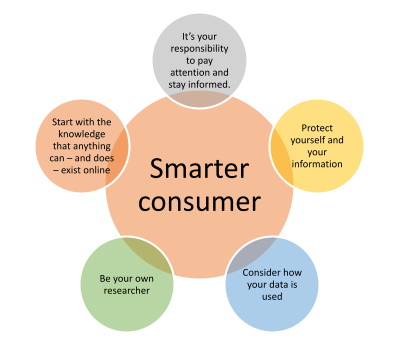Smart consumer concept

The fast development of user-friendly tech and immediate access to information has made the clients of today smart and aware. With ever increasing possibilities available at a tap of the touchscreen, consumer behaviour and preferences are forever in flux.
When you hear the word consume – where does your mind go to? It probably starts thinking about food and what you eat. To be fair, it’s not too far off. Consumption is about more than what you put into your mouth. It is what you do with your money and time. Your money buys food, shelter, clothing, games, car, knowledge, pensions, etc. Your time is spent learning a new skill or consuming the latest news event of the day. Getting this balance between creating and consuming can be tricky. If you get the balance right, it leads to improved financial capability.
New technologies are changing the ways in which consumers act. Thanks to technology, consumers are becoming more and more informed, empowered and demanding. Armed with knowledge collected from a multitude of sources, they are using their money on the goods and services they value. They want to interact in a way that is both relevant and timely: relevant to whatever they are shopping for, regardless of where, when and how they are shopping for it; and timely in fulfilling their needs. In short, today’s consumers are getting smarter. But, how can you be a smarter consumer?
Consumers of all ages and in all parts of the world are swarming to social media. Understanding social media is no longer optional; it is an imperative for being a smart consumer. Media saturation needs to become more active as consumers, in part to manage the torrent of data pouring over us each day but also to make informed judgments about the significance of what we do see.
What are the best ways to combat “fake news” and develop information- digital skills? The proliferation of false news in recent years has been echoed by a proliferation of recommendations about how to deal with it. The skills involved in combating misinformation are in fact the skills that you need to develop. Your challenge is to think about how factors external to the source itself, such as the author’s identity, audience, and purpose, may produce subtle distortions. Combating “fake news” thus requires to exercise your brain in a more effortful way, read not just with comprehension, but also discernment―in short, applying critical thinking to what you’re reading and buying.
Here are some recommendations for how to be a smarter consumer in the Digital Age:
- Start with the knowledge that anything can – and does – exist online.
That means real exists alongside fake, good alongside bad, legal alongside illegal, and everything in between. The internet can be a room full of dreams and it is also a place where you can see the most delicate part of the societal beast. It can be full of chances, conveniences, and enjoyment; it can also be a disloyal place waiting to trick, incite, be immoral and degrade. Buyer beware, times a million. The more you identify the internet’s duality, the more you will obviously see it for what it is, and also for everything that it isn’t.
- Be your own researcher.
Anyone online can technically be a ‘thought leader,’ but it is up to us whether we decide to give these concrete individuals enough power to truly obtain that pedestal as the “led”. We’re all followers of social influencers, personalities or brands we want to imitate, or those we allow influence over our thoughts or buying choices. Just because they publish information online does not mean they are a source for valid information – this is not a 1:1 equation. What you consume online should always be questioned, researched and fact-checked.
- Consider how your data is used.
The more data you facilitate online, the more targeted ads you will receive. But be aware that, beyond just what you offer, other private information is extracted from different sources. For example, think on deep before allowing online quizzes to access your profile information, which includes your birthdate, phone number, location, friends list, place of work, etc.
- Protect yourself and your information.
Sharing, or oversharing, information can provoke to receive annoying ads for things that seem important, or worse, can be used to manipulate you into the creation of specific opinions, spending money or adding your name as an endorsement of things you may not fully understand or support.
- It’s your responsibility to pay attention and stay informed.
It’s easy to want to ignore what is happening or to tell yourself that you can trust others to stay up-to-date on changes to internet usage, privacy laws and platform user agreements. However, if you continue to use the valuable parts of the internet, you need to accept there is a level of responsibility you own as a trade-off for those benefits.
Our modern society has become much more aware of products and services available to purchase, with highly intelligent advertising and marketing convincing us that we need that diamond ring, the latest phone or the toys for the shows that our kids watch on TV. Recognising this, there is an argument for practising good habits.
Smarter consumer (Source: Own elaboration)


